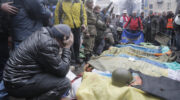Safety Europe
For these Ukrainian volunteers, mission is to bring elders out of harm’s way
| View caption Hide caption
Fleeing one’s home in war is often a difficult choice to make, but it is particularly so for Ukraine’s seniors, who have survived hard times before. It often falls upon volunteers to bring them to safety.
Mr. Humaniuk and his team are part of a broad constellation of volunteers who keep wartime Ukraine running and help save lives daily. Evacuating senior holdouts from front-line regions is a particularly tricky – and at times thankless – task. It’s an exercise that requires courage, patience, humor, and top-notch diplomatic skills. “This job is like being a salesman,” he says, flashing a winning smile while slipping into a flak jacket. “I tell them that they will have a nice room, be comfortable.”
But senior Ukrainians are hard to persuade. With their lives tied to their homes and a willingness to weather even the hardest times, they see little reason to relocate.
View caption Hide caption
“I’ve never considered evacuation,” says Anna, a retired nurse in the village of Kivsharivka, as Mr. Humaniuk visits. “I worry my home will be looted. If the shelling intensifies, then maybe we will leave. Very few people are left here. Those with children have left. Those who love themselves have left. I am tough and used to the harsh conditions of life. Winter will be hard, yes, but I survived World War II and hopefully I’ll survive this war, too.”
Mr. Humaniuk jokes that she barely looks a day past 40, leaving her with his business card and a huge smile. “If I consider evacuation, I will call you,” she promises.
“Maybe we will think about evacuation”
At the end of August, Ukrainian authorities ordered a mandatory evacuation of front-line villages around the city of Kupiansk, at the eastern edge of the Kharkiv region. One of those villages is Kivsharivka.
The majority of those who have disregarded the evacuation orders are older people, a handful of whom appear serene sitting on benches and soaking in the afternoon sunlight outside a row of midrise buildings. But they are troubled.
A yellow flower laid on the ground between two benches hints at the tragedy endured by Nataliia and Olena, who like many Ukrainians didn’t want to give their full names. They were sitting on the very same bench one month earlier when a mortar exploded nearby, killing Olena’s husband and wounding Nataliia. Still, neither of them is considering evacuation, even though Russian strikes remain routine in the area and the prospect of a second Russian occupation is not far-fetched in the assessment of Mr. Humaniuk.
“We do not worry about [the Russians],” says Nataliia defiantly. “We are the salt of this earth. If the water and electricity get cut here, then maybe we will think about evacuation.”
Mr. Humaniuk presses a business card into each woman’s hand, urging them to call should they change their mind. He did not come with the expectation of evacuating people this day as much as to build trust so that they reach out without hesitation when the time comes. And he believes it will come, despite all his faith in the Ukrainian armed forces.
“When I look back, I feel like my entire life prepared me for this,” he says, recounting a colorful résumé comprising stints as a salesperson, cargo loader, and bodyguard to a local oligarch, among other jobs. All experiences left him better equipped to undertake the mission of ushering old people to safety.
“That is why we do this now,” he shares. “We know the risks will be 80% greater later.” The risks are already high. Just a day after this visit to Kivsharivka, eight people were killed in the area when another volunteer team evacuating people was struck by a Russian rocket.
Speaking in his apartment, middle-aged Oleksii is willing to give evacuation some serious thought. But he is limited by his bedridden mother, Anna, and his determined-to-stay mother-in-law, Tamara, both of whom live with him. The village still has electricity and water, they’ve collected firewood for the winter, and they still get humanitarian aid. But staying proved a choice costly to his 4-year-old son, Maksym, who was struck by shrapnel and now has nerve problems that cause his legs to cramp.
View caption Hide caption
While Tamara tries to tune out the stress of war by watching television shows, the boy takes a restorative nap. Nighttime battles have robbed him of countless nights of sleep. “He climbs into my arms, petrified,” whispers his frustrated father. “It’s very loud at night.”
Outside on the street, Mr. Humaniuk continues his sales pitch with an equally tough crowd at an adjacent building. “What will I do there [in Kharkiv]?” asks Claudia Shevchenko, eyebrows arched in skepticism. “How long can I stay?”
“Until it is safe here,” Mr. Humaniuk reassures her.
“The only plan we have is to go home”
Those who do evacuate end up in dormitories scattered around Kharkiv, unless they have relatives they can join in other parts of Ukraine.
Nadia Kozlova was brought by volunteers to Kharkiv from the village of Vovchansk, which spent eight months in 2022 under Russian occupation and remains in the crossfire. “The situation became unbearable,” she says of her decision to finally call for help. “I hesitated because I didn’t want to leave my house. I thought that the situation would calm down. But in the end, I felt encircled. The bombs were landing closer and closer, so I decided to go.”
Ivan Kozyrev was rescued along with his wife after his leg broke. Russia’s strikes on their village of Kucherivka drove them to seek shelter in an outdoor basement in the middle of the night. He, however, took a nosedive down the shelter’s stairs after failing to notice its door was already open. “All I remember is that I could not feel anything when I was evacuated,” he says with tears. “The clock in the car said 3 a.m.”
View caption Hide caption
“Don’t worry, dear – we will have our golden anniversary soon and dance together again,” his wife, Zoya, reassures him gently. “The only plan we have is to go home as soon as possible.” In addition to worrying about her husband, she frets for two grandchildren on the front line, especially after seeing a neighbor robbed of his life by a Russian missile.
Those in the dormitory are struggling with the aches and pains of old age, amplified by the physical and mental traumas of war. “Stress, stress, stress,” says Valentyna Tkachenko, the day’s de facto administrator after directing people toward bread-distributing volunteers while simultaneously calling paramedics to help a man who appears to be in distress. It’s like running a hospice or a mental institution, she says, minus the qualified staff.
Outside, a different Valentina takes a relaxed stroll. She is grateful to be there and to have known whom to call when the shelling intensified around her home in August. Volunteers had posted their numbers on every door of her village. A car right in front of theirs was hit, its passengers killed, while she evacuated. It was a close call, so she counts herself fortunate.
“It is very dangerous work these volunteers are doing,” she says with deep appreciation. “Every minute can be the last for them, and no siren will warn you.”
Reporting for this story was supported by Oleksandr Naselenko.




